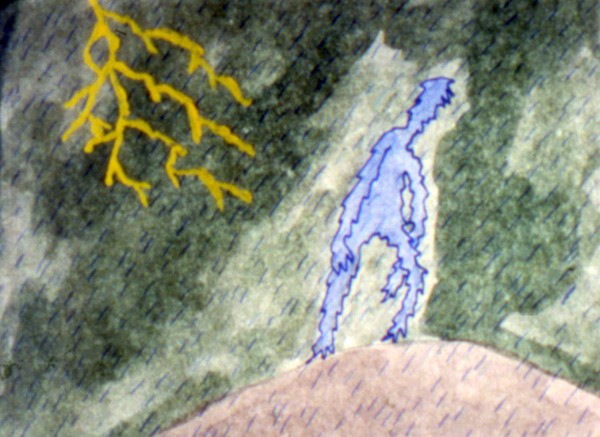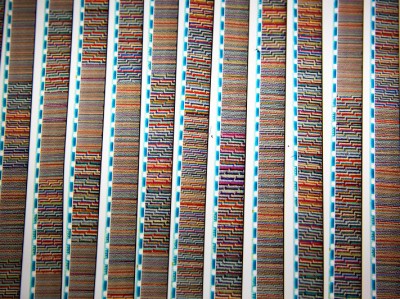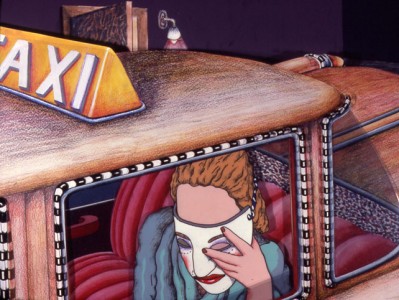
Helen Hill (1970 - 2007) was an experimental animator, filmmaker, educator, artist, writer and social activist who lived her last years in New Orleans, Louisiana. A native of Columbia, South Carolina, Hill revealed her artistic talents at an early age, making her first short, animated Super 8 films when she was eleven. While studying English at Harvard (BS '92), she minored in Visual and Environmental Studies where she made three 16mm animated short films: Rain Dance, Upperground Show and Vessel. After receiving an MFA from the California Institute of the Arts in Experimental Animation, Hill, along with her husband Paul Gailiunas, moved to his native Canada where he was studying medicine and where she continued to create films and teach film animation at the Nova Scotia College of Art and Design (now NSCAD University) and at the Atlantic Filmmakers Cooperative (AFCOOP). Soon after, Hill and Gailiunas moved to New Orleans where Gailiunas would found a medical clinic for artists and low-income patients and where Hill, meanwhile, co-founded the New Orleans Film Collective and taught filmmaking.
Featuring puppets, hand-drawn animation, found footage and hand-processing techniques, Hill's short films—including Bohemian Town (2004), Madame Winger Makes a Film: A Survival Guide for the 21st Century (2001) and Mouseholes (1999)—have been screened at festivals all over the world. She is also the author of a lavishly illustrated and self-published book called Recipes for Disaster which compiles techniques for hand-processing film. This modest, spirited compendium became esential in the film/art classroom and continues to inspire amateur and experimental filmmakers around the world.
Tragically, Helen Hill was murdered by a random intruder in her New Orleans home in the early morning of January 4, 2007, one of six murders in New Orleans in a single twenty-four-hour period. In an extraordinary and in many ways model collaboration between Helen’s family, the Harvard Film Archive, New York University’s Moving Image Archiving and Preservation Program, Colorlab, the Orphan Film Symposium, the University of South Carolina and countless individuals, Helen Hill’s films—including shorts, animation and home movies, as well as her papers—were organized and donated by Paul Gailiunas to the Harvard Film Archive that same year. Shortly thereafter, guided by the coordination efforts of Dan Streible, ten of her films were preserved by Harvard and Colorlab. One title, Rain Dance (1990), was preserved at Colorlab, under the direction of Bill Brand as an NYU MIAP project, and all were put back into distribution in late 2007. In December, 2009, the Library of Congress named Hill’s film Scratch and Crow (1995) to the National Film Registry, a list of aesthetically, historically and culturally significant American motion pictures. The Library’s news release stated: "Helen Hill’s student film was made at the California Institute of the Arts. Consistent with the short films she made from age eleven until her death at thirty-six, this animated short work is filled with vivid color and a light sense of humor. It is also a poetic and spiritual homage to animals and the human soul."
Every year since 2008 the Orphans Film Symposium bestows a Helen Hill Award, sponsored by the NYU Cinema Studies and the University of South Carolina Film and Media Studies Program, to “affirm Helen Hill's artistic legacy, lived values, and everyday passions. In a film culture dominated by corporate interests and the values of consumerism, the Helen Hill Award supports radically independent, innovative filmmaking of exceptional talent. The award will be presented to a filmmaker whose work celebrates and embodies such things as creativity, self-expression, animation, small-gauge film, homemade movies and all things made by hand, collaboration, generosity, liberal spirituality, activism, love, play, community, and connection.”
In 2009, Gailiunas painstakingly completed his wife's unfinished work, The Florestine Collection—a portrait of a New Orleans African-American seamstress named Florestine Kinchen whose handmade dresses inspired Hill when she found one hundred fabulously patterned and colored dresses mysteriously abandoned on the street. Following the thread of the Florestine mystery and Hill's own notes, her husband not only crafted a "study of an outsider artist whose dresses emblematize the unique color and texture of New Orleans," but a poignant tribute and collaboration with his late wife.
Preservation
Ten of Helen's films were preserved in collaboration with Colorlab and the Orphan Film Symposium in 2007:
- Madame Winger Makes a Film: A Survival Guide to the 21st Century (2001)
- Mouseholes (1999)
- Scratch and Crow (1995)
- Film for Rosie (2000)
- Vessel (1992)
- Tunnel of Love (1996)
- Bohemian Town (2004)
- Your New Pig Is Down the Road (1999)
- The World's Smallest Fair (1995)
- Rain Dance (1990) – Restored in 2007 by Bill Brand and graduate students in the Film Preservation class of NYU's Moving Image Archiving and Preservation Program. For the full history, see PDF below.
Helen Hill's home movies were preserved in collaboration with the Center for Home Movies, the Women's Film Preservation Fund, and the Harvard Film Archive. A sample can be viewed below.
Helen Hill's Home Movies - reel 38. HFA item #16368. Documentation of the Southern Decadence Parade in New Orleans, followed by footage of the gravesite of Ernie K-Doe (1936-2001).
Distribution
The ten preserved 16mm titles listed above are available for loan to qualified venues. Please see the HFA's Lending Policies for details on the process. In 2021, new digital copies of each of these titles will also be available for loan.
Research
A finding aid for the Helen Hill Collection can be found here. Individual titles from this collection are also searchable in Harvard’s Hollis catalog. Many of Helen Hill's films can be viewed on a dedicated Vimeo channel.









